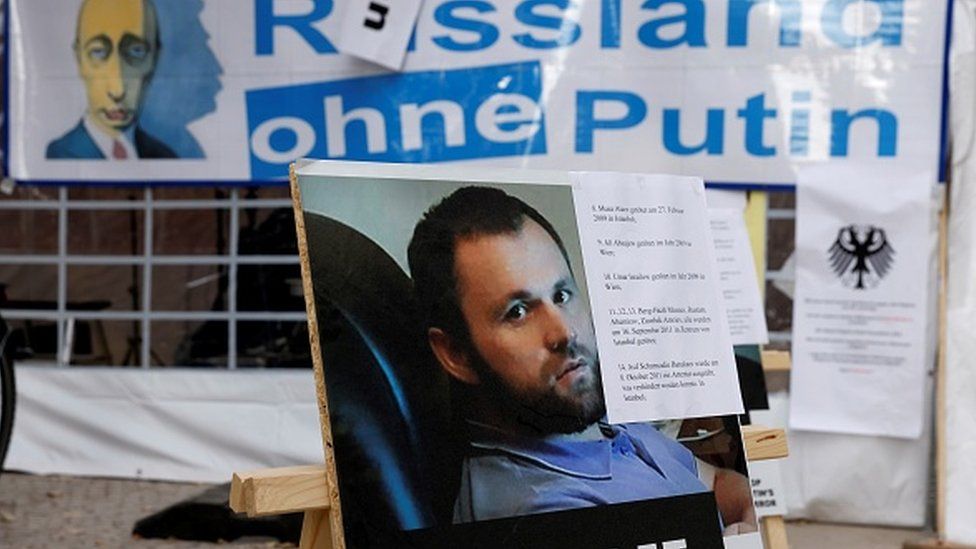Germany expels Russian diplomats after hitman sentenced in Berlin
- Published

Germany is expelling two Russian diplomats after a German court jailed a Russian man for life for a murder in a Berlin park and said it had been ordered by Moscow.
Vadim Krasikov was found guilty of shooting Zelimkhan Khangoshvili in the head at close range in August 2019.
The victim was a former Chechen rebel commander of Georgian origin.
The verdict is likely to further damage already strained relations between Germany and Russia.
Foreign Minister Annalena Baerbock said the court had found that the murder was carried out "on the order of state agencies of the Russian Federation" and it was a serious violation of German law and sovereignty.
Russian ambassador Sergei Nechayev had already rejected the verdict as a "politically-motivated decision" when he was summoned to the foreign ministry and told that two members of his embassy staff were now unwelcome in Germany.
Khangoshvili - who lived for a time under the name Tornike Kavtarashvili - was shot dead in Berlin's Tiergarten park on 23 August 2019.
The 40-year-old Georgian national was a Chechen rebel commander between 2000 and 2004, when Chechnya was fighting a war of independence against Russia.
He had been an asylum seeker in Germany since 2016.
Prosecutors said Krasikov came up behind Khangoshvili on a bicycle and fired a shot into his torso using a silenced Glock 26 pistol. He then fired two more shots into the victim's head as he lay on the ground, killing him, prosecutors said.
Krasikov was arrested shortly after the killing, which happened just a short walk away from Germany's parliament.
During the trial, prosecutors said the attacker was acting on orders from Russia, and that he belonged to a special unit of its secret service, the FSB.
Prosecutors said Krasikov flew from Moscow to Paris and from there to Warsaw, before arriving in Berlin, using a passport in the name of Vadim Krasikov.
"He liquidated a political opponent as an act of retaliation," prosecutor Lars Malkies told the court.
In his defence, lawyers said the suspect was a construction worker. He identified himself as Vadim Sokolov and denied being known as Krasikov, telling the court: "I know of no-one by this name".
But judges who sentenced Krasikov said they were convinced that he was acting on the orders of Russian authorities.
"Russian state authorities ordered the accused to liquidate the victim," the Berlin court's presiding judge Olaf Arnoldi said after sentencing.
"Some media suggested that Russia or even [Russian president] Vladimir Putin are on trial here," the judge said. "That's misleading: only the convict is on the bench. But our task does involve considering the circumstances of the crime."
Russia has been linked to the deaths of other Chechen exiles.
In 2004, two Russian nationals were convicted in Qatar for the murder of former Chechen leader Zelimkhan Yandarbiyev. They were sentenced to life in jail by the court, which ruled that they were acting on the orders from the Russian government.
In the media, the attack on Khangoshvili has been compared to the attempted murder in the UK in 2018 of Russian former intelligence agent Sergei Skripal and his daughter.
Russia has previously denied it orchestrated Khangoshvili's killing and dismissed such allegations as "absolutely groundless".
Germany had already expelled two Russian diplomats months after the murder over suspicions of Kremlin involvement and Russia responded in kind.
Two years later relations between the the two countries are no less tense, with Chancellor Olaf Scholz's new government in Berlin promising a tough response to Russia's recent military build-up near Ukraine.
Ms Baerbock warned this week that a completed Russian gas pipeline to Germany that is still awaiting approval by the German energy regulator would not be allowed to start operating "in the event of further escalation".
- Published18 June 2020
- Published3 December 2019
- Published4 December 2019